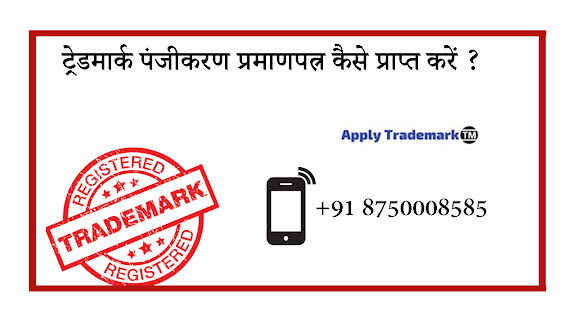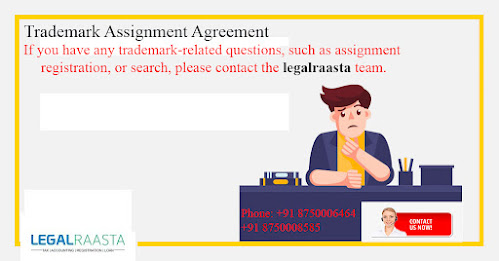Be sure to trademark your business in order to stand out from the crowd
A trademark
is a distinct identity that can be a word, a name, a color, a logo mark, a
goods shape or a sound mark that you use to distinguish your product from
competitors' products. A trademark is something that distinguishes a service,
product, or business from the competition. Once the trademark is registered,
the person whose name is entered as the applicant on the registration form will
be the owner of the trademark. A TrademarkRegistration in India is your company's intellectual property or intangible
asset that protects the investment you've made in building trust and loyalty
among your customers.
What is Trademark Registration?
The Trade
Marks Act of 1999 established a legal process for Trademark Registration. By registering a trademark, you can protect
and obtain ownership of your brand, logo, or name by preventing others from
using it.
To prevent
third parties from infringing on a company's or individual's logo, Trademark Registration is Necessary. Trademark registration grants the owner
exclusive rights to use the mark in conjunction with its products. The
registration allows you to sue anyone who attempts to copy your trademark and
prevents others from using a similar trademark to the one you registered, so Legalraasta
will help you register your trademark.
Why Is Trademark Registration important for a business?
Ø It demonstrates your distinct identity by instilling
trust and loyalty in your customers.
Ø It also provides legal protection for your
brand's identity, preventing unauthorized use of your brand's identity.
Ø It serves as an asset for your company.
What is the procedure for registering a trademark in India with
LegalRaasta?
Step 1: Trademark
Search: A trademark must be carefully chosen
or created. When selecting a trademark, conduct a trademark search to ensure
that it is distinctive, as trademarks cannot be changed once they have been
registered. If another party has already registered a similar or identical
trademark to yours, you must amend or modify yours before proceeding.
Step 2: Filing
Trademark Application: The next
step is to electronically fill out a Trademark Application, which must include
a copy of the trademark, proof of claim, and a power of attorney. If the form
is submitted, an acknowledgement can be obtained immediately and used as the
trademark symbol (TM).
Step 3:
Examination: The Controller
General of Patents, Designs, and Trademarks establishes rules and guidelines
that the Trademark Officer verifies in the application and evaluates to see if
the case complies.
Step 4: Trademark
objection: If the trademark
officer discovers any problems or requires additional information, he or she will
issue a trademark objection notice.
Step 5: Opposition: An opposition to a Trademark Registration in India is an objection filed by a third
party, who can be either a natural or legal person. It is not necessary for the
person filing the opposition to have a financial stake in the dispute or to
already have a trademark registered with the Registry. An opposition must be filed within 90 or, in
some cases, 120 days of the date of publication.
Step 6: Publication:
If the officer is satisfied with the response,
the Registrar will publish the trademark in an Indian Trademark Journal once
the examination procedure is complete.
Step 7: Hearings:
If the registrar authority is dissatisfied
with the response submitted in response to the objection raised in the final
report in the trademark certification procedure, a trademark hearing is held.
Step 8:
Registration Certificate: The
registered trademark R sign may be used in conjunction with your brand name as
soon as you issue your certificate, and you will receive a form acknowledgement
within 15-20 days.
Documents Needed for Trademark Registration
Ø Name of the applicant
Ø Business name and goal
Ø Company name, slogan, or logo
Ø Registered address
Ø Identity verification (Aadhaar card, driving
license, passport, voter ID)
Ø Address confirmation (kind,purpose, and
location of the business)
Ø MSME & COI if the business is a
corporation, small, startup, or other entity.
Ø A partnership deed if the company is a
partnership.
Is it easy to register a trademark with Legalraasta?
Ø We run a trademark search and conduct a
thorough search of the TM directory to determine if it is distinctive.
Ø As part of the Trademark Registration Process, we prepare an authorization letter
for you.
Ø Our experts will advise you on which trademark
classes to apply for; there are nearly 45 trademark classes, 11 of which are
for services and the rest are for products.
Ø We complete the entire trademark application
form and attach the necessary documents before submitting it to the Registrar.
Ø You will be kept updated throughout the
registration process.
Ø If an objection is raised, we will attend your
trademark hearings on your behalf.
Conclusion
The most difficult task is most likely
obtaining a Trademark Registration in
India. It can take years to register your trademark, but the effort is well
worth it. The trademark policy is well known among Indian businesspeople. The
process involves numerous steps and a significant amount of money. Because
there is no going back, you must choose your brand's logo or symbol with
extreme caution. As a result, it is recommended that you choose or create with
caution. So, in the preceding article, we
discussed how one should select a different process to register a company's
trademark. If you have anything to add to or comment on this article, please
leave a comment below or contact us via email for any Trademark Registration related questions. Then contact our Legalraasta
team to register your trademark with the assistance of our IP experts. And it
simplifies the process of registering a trademark because the investment in
legally protecting your brand is well worth it. Throughout the procedure, you
will be given the best possible care and all of your questions will be
answered.



.jpg)
Comments
Post a Comment